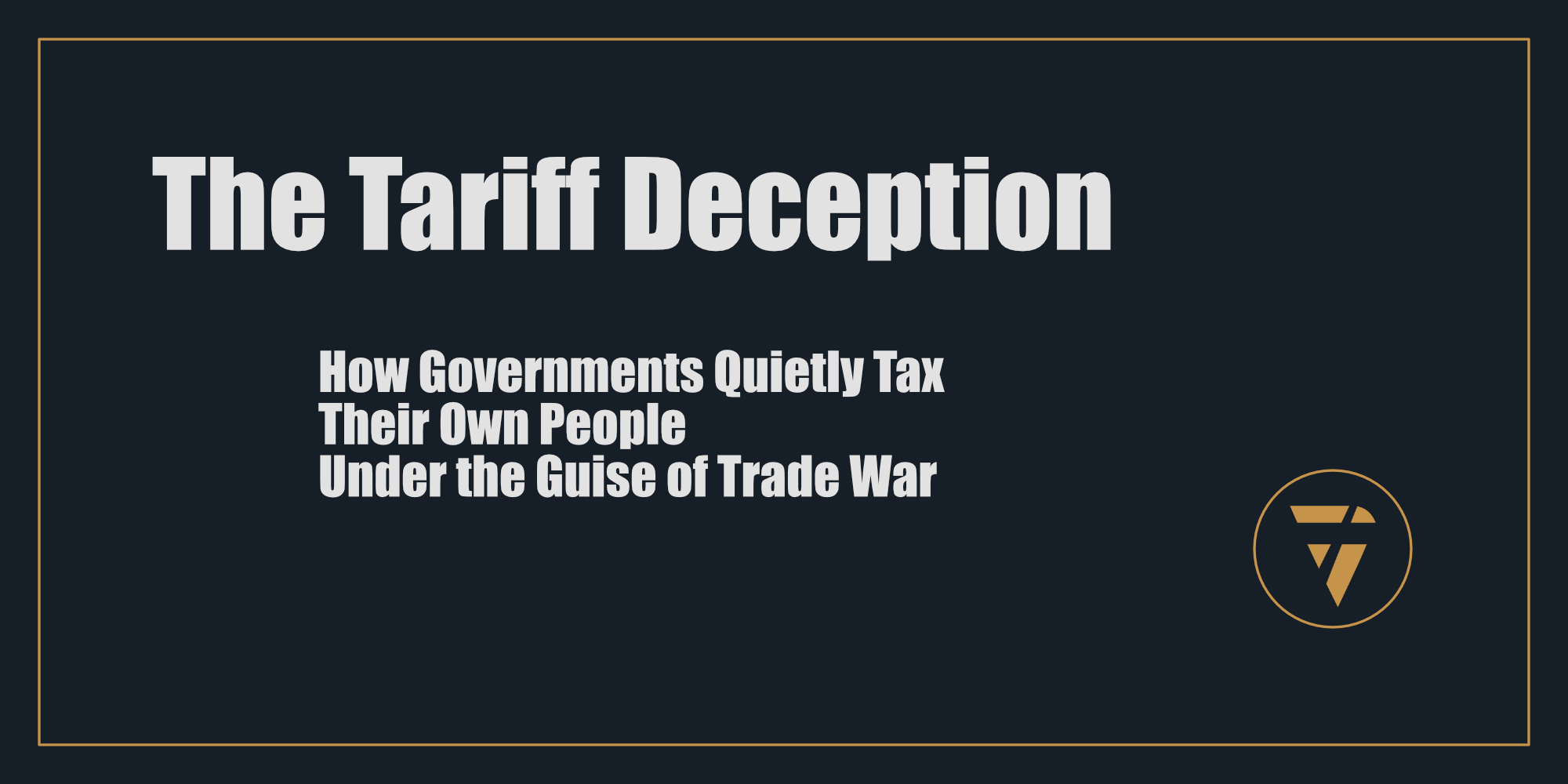The Tariff Deception

How Governments Quietly Tax Their Own People Under the Guise of Trade War
Governments love a good story. One of their favourites is the tale of the tariff as a weapon of economic defence, a noble measure to protect domestic industries, save jobs, and fortify national strength. It’s a narrative that resonates, evoking a sense of economic patriotism that convinces the public to rally behind policies that seem like an act of national self-preservation.
But what if that’s all it is? A story. A carefully crafted illusion designed to hide the real objective?
The truth is that tariffs aren’t about trade. At least, not in the way they’re sold to the people. What if they are simply a government cash grab, another tax levied against its own citizens under the pretence of economic warfare? A hidden tax disguised as policy, one that extracts wealth from its own people while shifting the blame elsewhere.
It’s a masterstroke in political sleight of hand.
The Hidden Tax: How Tariffs Work in Reality
Let’s strip away the rhetoric and get to the mechanics.
A tariff is a tax on imported goods. When the U.S. imposes a tariff on steel, for example, foreign producers don’t just eat the cost—they pass it down the supply chain. That means American businesses that rely on imported steel—construction companies, car manufacturers, appliance makers—suddenly find themselves paying more. And, as any business does when costs rise, they pass that burden onto the consumer.
The end result? Americans are paying more, not foreign manufacturers.
It’s a direct financial hit to the people the government claims to protect.
Governments know this. Tariffs have long been a tool for revenue generation, dating back to the pre-income tax era when duties on imports were a primary source of government funding. Today, in a world where direct tax hikes are politically toxic, tariffs offer a workaround—a revenue stream that most citizens don’t realize is coming straight out of their wallets.
It’s the perfect invisible tax. The government collects billions while the average citizen doesn’t see a line item on their tax return. Instead, they see rising grocery bills, higher car prices, and more expensive electronics. They blame inflation, corporations, or foreign policy tensions. Few realize that what they’re actually paying is a tariff—a tax imposed not on China, not on Europe, but on themselves.
The Political Cover-Up: Selling a Lie
Governments don’t sell tariffs as a tax. That would be too obvious. Instead, they wrap them in the flag and frame them as a tool of national strength—“Buy American!” “Protect Our Industries!” “Fight Canada’s Unfair Trade Practices!”
It’s brilliant politics.
By stoking economic nationalism, the government redirects public frustration outward. It convinces people that paying more is a patriotic duty rather than an imposed burden.
Meanwhile, the actual mechanics of the economy remain unchanged. Corporations don’t shift manufacturing back to the U.S. overnight. Businesses don’t suddenly start paying American workers more just because foreign imports are taxed. Instead, they find loopholes, pass costs down, and automate wherever possible.
And the government keeps collecting.
Who Really Wins?
The biggest winners in this game are:
- The government – Billions in tariff revenue flow straight into federal accounts, funding everything from military budgets to pet projects, all without needing to pass a politically dangerous tax increase. Sovereign wealth fund anyone?
- Select industries with strong lobbies – Steel tariffs, for example, might help domestic steel producers—but at the cost of every other industry that uses steel. A few gain, while the many suffer.
- Politicians – Leaders sell tariffs as economic patriotism, leveraging the illusion of strength to rally their base and distract from more systemic economic issues.
And who loses?
- The average citizen – Prices rise across the board, impacting the working and middle class the hardest. Everything from groceries to cars to housing becomes more expensive.
- Businesses reliant on imports – Smaller companies without the ability to absorb rising costs or shift supply chains struggle to stay competitive.
- The economy as a whole – Higher costs suppress spending, slow investment, and encourage market inefficiencies that drag down long-term growth.
The Great Fleecing: What Happens Next?
What makes this so dangerous is its subtlety. Because the true impact of tariffs doesn’t hit overnight, it’s harder for the public to connect cause and effect. People simply wake up to a world where prices are higher, but the messaging they hear is that this is necessary to win the trade war.
Governments have weaponized tariffs not against foreign competitors, but against their own people.
It’s taxation without realization. An economic magic trick that drains wallets while keeping the audience clapping.
So what happens next?
If people don’t wake up to the truth, tariffs will continue to be used as a political tool, a quiet siphon of economic power that strips wealth from citizens while feeding the machine of government. And every time they need more, the justification will be simple: “We’re protecting you.”
But protection shouldn’t feel like a shakedown. And patriotism shouldn’t be the price tag for manipulation.
The next time a tariff is proposed, ask yourself: Who really pays for this? Who really benefits? And what if this was never about trade at all?
It’s time to stop believing the story and start following the money.
This is what I’m working on. Tell me what you think, I enjoy the conversation! Subscribe and follow the work in real time.
Thanks!
B

Tariffs aren’t about trade. They’re a hidden tax on you. Prices rise, but the government collects. Wrapped in patriotism, sold as protectionism—yet the only ones protected are the ones cashing in. Follow the money, not the headlines.
PS -






